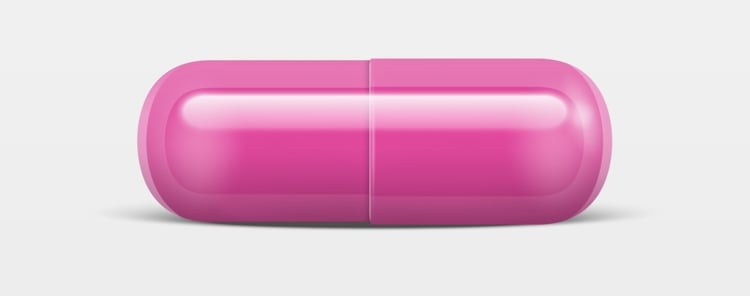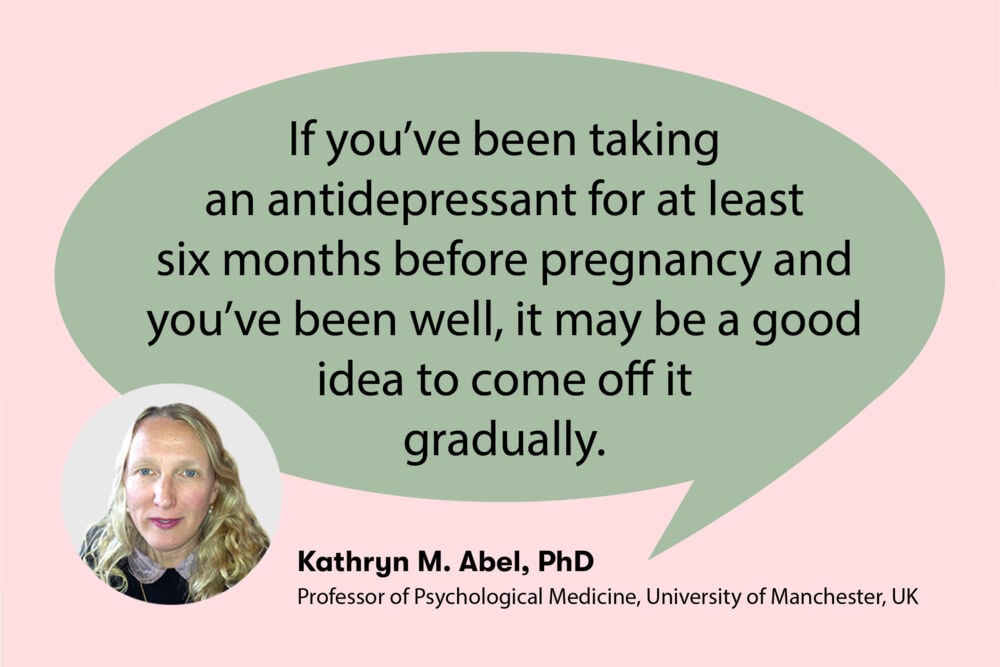Maybe you were taking antidepressants when you got pregnant, or maybe you’ve been prescribed antidepressants to treat an issue you’ve developed during pregnancy. No matter the scenario, antidepressants should be taken seriously. To clear up some of the confusion on the subject, we conducted a series of interviews with Professor of Psychological Medicine, Kathryn M. Abel.
-
Tracking cycle
-
Getting pregnant
-
Pregnancy
-
Help Center
-
Flo for Partners
-
Anonymous Mode
-
Flo app reviews
-
Flo Premium New
-
Secret Chats New
-
Symptom Checker New
-
Your cycle
-
Health 360°
-
Getting pregnant
-
Pregnancy
-
Being a mom
-
LGBTQ+
-
Quizzes
-
Ovulation calculator
-
hCG calculator
-
Pregnancy test calculator
-
Menstrual cycle calculator
-
Period calculator
-
Implantation calculator
-
Pregnancy weeks to months calculator
-
Pregnancy due date calculator
-
IVF and FET due date calculator
-
Due date calculator by ultrasound
-
Medical Affairs
-
Science & Research
-
Pass It On Project New
-
Privacy Portal
-
Press Center
-
Flo Accuracy
-
Careers
-
Contact Us
Antidepressants During Pregnancy: 5 Most Important Questions Answered by the Psychiatrist


Every piece of content at Flo Health adheres to the highest editorial standards for language, style, and medical accuracy. To learn what we do to deliver the best health and lifestyle insights to you, check out our content review principles.
Interview has been edited for clarity.
How many pregnant people experience depression?
Dr. Abel says that it’s difficult to define how many people are actually experiencing depression during pregnancy, because it depends on a few factors. For instance, the information from high-income populations in the West suggests that between five and 10 percent of people are depressed while they’re pregnant. And this number may be higher in low-income communities or in other countries.
How often are antidepressants prescribed during pregnancy?
“Two very good studies report that, in recent generations, many more pregnant people are getting depressed,” says Dr. Abel.
Since 2005, significantly more young females from the age of 15 are being treated with antidepressants. In the UK, 10 to20 percent of this population are taking antidepressants; and many of them will also get pregnant.
Take a quiz
Find out what you can do with our Health Assistant
It isn’t completely clear if this increase is because more people are actually depressed or because it’s more common for people to talk about things like depression, which leads to more people seeking treatment and showing up in the data.
“But, what we are sure about is that, since 2005, significantly more young females from the age of 15 are being treated with antidepressants. In the UK, 10 to 20 percent of this population are taking antidepressants; and many of them will also get pregnant,” says Dr. Abel.
She also mentions that most people don’t know that they’re pregnant for anywhere from 6 to12 weeks, when they’ve missed at least two periods. So, people who take antidepressants are definitely getting pregnant.
Dr. Abel also says that according to the UK data, if you’re diagnosed with depression during pregnancy, you’re 12 times more likely to be treated with an antidepressant than someone who does not have a mental illness diagnosis.
If you have a mental illness diagnosis that isn’t necessarily depression, you are still about eight times more likely to be treated with an antidepressant.
So, currently, lots of pregnant people are being treated with antidepressants.
“In the UK at least, health care providers in primary care are not likely to start people on an antidepressant during pregnancy without referring them to a specialist. But, very large numbers of people may be on an antidepressant at some time during pregnancy, even if many of them stop once they know they are pregnant,” says Dr. Abel.
“It’s hard to know the number of people who only start an antidepressant during pregnancy because the information available is not very accurate.”
What are the factors for being prescribed antidepressants during pregnancy?
According to Dr. Abel, when considering antidepressants during pregnancy, it’s really important to have a conversation with the person recommending starting or continuing them:
“The most important thing is that every decision is collaborative. In other words, it’s a decision-making process that occurs between the treating clinician and the person and their family. And one of the most important things is how ill the person becomes when they’re not on medication or how severe their depression is,” says Dr. Abel.
When considering antidepressants during pregnancy, it’s really important to have a conversation with the person recommending starting or continuing them.
If someone has relatively mild to moderate depression, there are many things that might be helpful. For instance, Dr. Abel says that talk therapy, other forms of psychological support, physical activity, a good diet, and other things may all improve mental health.
“A pregnant person’s general health is very important,” says Dr. Abel. “Enough rest and plenty of sleep are important. If someone has other children, it’s important that they have help, are supported, exercise regularly, avoid alcohol or other drugs, and eat well. It’s also important for them to attend their prenatal appointments and take folate supplements.
These tips sound very much like what we may hear in any sensible advice column; they’re just sensible, preventive public health measures about general health and general mental health and mood.”
Dr. Abel also says that it’s important to get support from others — like trusted family and friends — and to stay in contact with people to avoid becoming isolated.
“And if it’s someone’s first pregnancy, booking early into prenatal clinics will mean they get lots of helpful information from the staff because most prenatal services understand the difficulties people experience and the risks of poor mental health.”
Dr. Abel believes that prenatal care is one of the best aspects of health care worldwide. In some settings, wise women such as doulas, grandmothers, or mothers in the community can provide information that’s really helpful. This makes it possible to get a lot of support in an informal way, which can prevent the need for antidepressants.

Another decision to make with a doctor, according to Dr. Abel, is whether or not to stop taking a medication once you know you’re pregnant. “If you’ve been on an antidepressant for at least six months before pregnancy and you’ve been well, it may be a good idea to come off it gradually. And the likelihood is your mood will remain stable.”
Does getting an antidepressant prescription depend on the term of pregnancy?
According to Dr. Abel, the answer here depends on what you want to achieve with medication. If someone is unwell enough to need antidepressants, they should be treated at whatever stage of pregnancy they’re in.
If they’re well and stable on medication, it may be preferable to withdraw before getting pregnant to avoid exposure in the first 12 weeks of pregnancy, which is a critical time for brain development.
If there are concerns about postnatal withdrawal in the infant, then avoiding antidepressants in the last 12 weeks of pregnancy is advisable. “However, overall, a decision should be made on the basis of the patient’s clinical need because there really isn’t the information available to answer this question with any degree of certainty with respect to how these medications affect the infant.
“Most people are likely to have mild illness and we cannot ethically randomize people to receive antidepressant or a placebo, as that is not considered ethical,” says Dr. Abel.
“We are involved in a big piece of European work that hopes to look at a range of different stressors on the embryo and their effects in infants and children. So maybe in five or 10 years’ time, you can ask me again, and I will have the information!”
Dr. Abel says that if someone experiences a major bereavement or other adversity, the growth and development of the fetus can be compromised.
“And it certainly looks like the first 12 weeks of pregnancy, or the first trimester, is a more sensitive period. That’s probably because it’s when so much development is happening in crucial areas of the central nervous system and brain. At about 16 weeks of pregnancy, the testes, if present, start to produce testosterone, and this may be a particularly important period for male fetuses. However, there is little research to guide us on sex differences.”
“Things that we now do globally include routine prenatal care, giving folate in the first trimester, and checking the growth of babies using ultrasound and clinical examination throughout pregnancy,” says Dr. Abel. “At these appointments, they’ll check your baby and ask you a lot of questions; importantly, they take your blood pressure, test urine for sugar, and check your kidneys. There are so many ways in which we keep babies and pregnant people healthy today.”
Dr. Abel says that it’s difficult to know what causes the particular increase in problems that is seen in pregnant people with mental illness and their infants: they could stem from taking medication during the first trimester, or it could be that the pregnancy was just very high risk to begin with, so it wouldn’t matter if they had taken antidepressants at any point during pregnancy, regardless of trimester.
“We do know that infection in the first trimester has a greater effect on fetal growth and prematurity than, say, an infection later in pregnancy. But if you have an infection like malaria, for example, in the second or third trimester, you may lose your baby. So, all of pregnancy is a time of risk, but, for development, the first trimester is the most sensitive period.”
Is it safe to stop taking antidepressants abruptly when pregnancy occurs?
Dr. Abel says that it’s safe in as much as it is unlikely to be fatal to stop taking antidepressants abruptly.
“But, if you think about taking antidepressants and stopping them abruptly when you are not pregnant, what we know is that you are likely to experience withdrawal symptoms, particularly with SSRIs (selective serotonin reuptake inhibitors). This can make people agitated, anxious, and have difficulty sleeping,” warns Dr. Abel.
“So these same withdrawal phenomena would be likely to occur if someone were to abruptly stop taking them when they discover they’re pregnant. In pregnancy, your blood volume increases by around 20 percent, so pregnancy reduces the concentration of antidepressant in the blood.”
Dr. Abels suggests stopping antidepressants very gradually: under medical guidance over two to three weeks, in the same way you would if you weren’t pregnant.


Hey, I'm Anique
I started using Flo app to track my period and ovulation because we wanted to have a baby.


The Flo app helped me learn about my body and spot ovulation signs during our conception journey.


I vividly
remember the day
that we switched
Flo into
Pregnancy Mode — it was
such a special
moment.
Real stories, real results
Learn how the Flo app became an amazing cheerleader for us on our conception journey.







